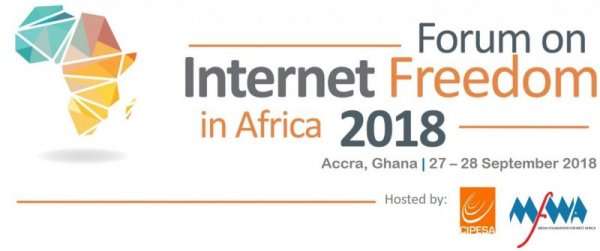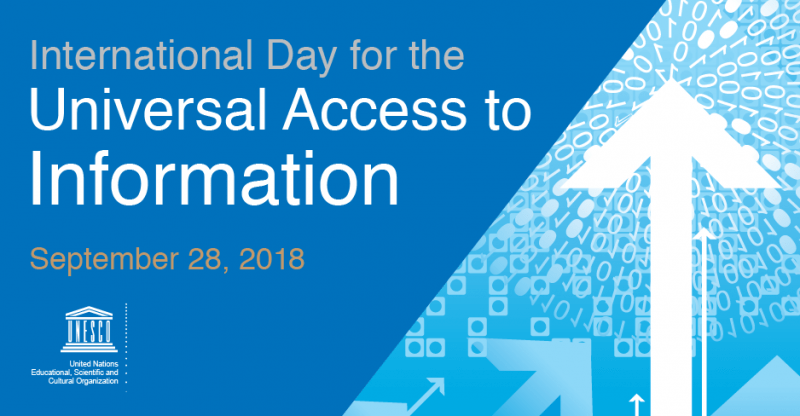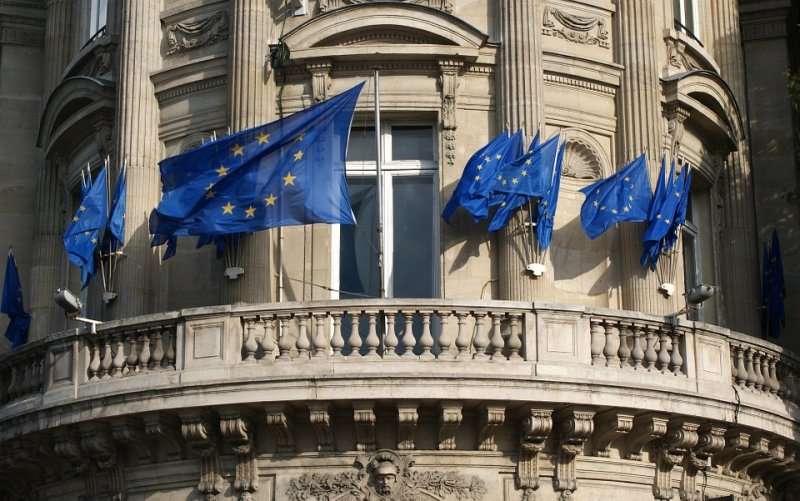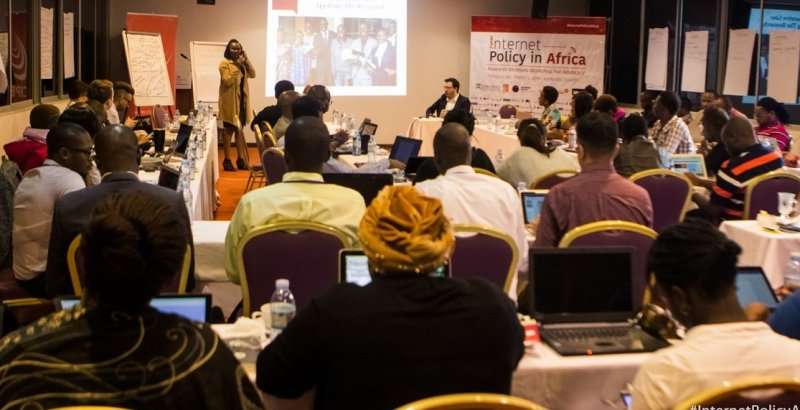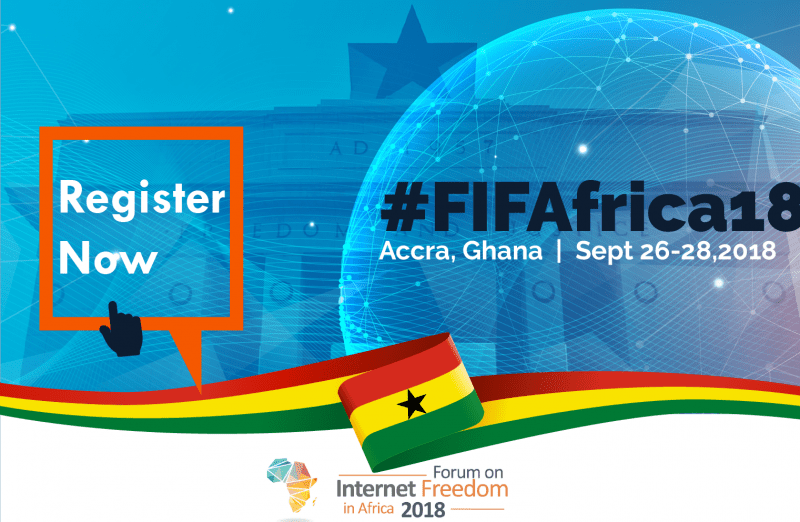By Juliet Nanfuka |
In less than a month, the Forum on Internet Freedom in Africa 2018 (#FIFAfrica18) will take place in Accra, Ghana. Hosted by the Collaboration on International ICT Policy for East and Southern Africa (CIPESA) in partnership with the Media Foundation for West Africa (MFWA), this year’s Forum is the first to be held in West Africa. Since its inception in 2014, the Forum has been hosted in East Africa and Southern Africa.
FIFAfrica focuses exclusively on internet rights and freedoms and looks at them through the lens of policy, regulation, and governance. It offers a platform for critical engagement of diverse stakeholders in identifying the most pressing internet rights-related issues and challenges that have to be addressed at national and regional levels. It also identifies opportunities for bringing the debate on the importance of human rights online at national, regional and global fora and aims to identify effective ways to engage with them.
At the practical level, the Forum works to support skills development including in digital security practices for safe and secure ICT access and adoption, policy advocacy, and engagement processes.
Engagements at the Forum reflect current trends and concerns in access and usage of the internet and related technologies on the continent. As such, each year since 2014 has seen us launch themed research on the State of Internet Freedom in Africa. The Forum also coincides with the annual commemoration of the International Day for Universal Access to Information (IDUAI) that is marked every September 28.
This year we have lined up panel discussions, workshops, hubs, exhibitions and lightning talks on a diversity of topics including advancing advocacy and research on gender-based cyber violence in Africa, civic technology and social innovation, online content regulation trends in Africa, and community networks for internet access. Other topics include: African content online, consumer rights in the digital age, digital rights advocacy, the economic costs of social media taxes and internet shutdowns, as well as media and misinformation, and protecting vulnerable users of the internet. Additionally, FIFAfrica will provide a stage for the first assembly of the Ethiopian Zone 9 Bloggers since their release, where they will share their experiences of censorship amidst the plight of freedom of expression.
The Forum agenda and sessions have been shaped by a public call for proposals and speakers and thus represent diverse voices, expertise and stakeholder groups, many of them new to FIFAfrica.. Among these are the Council of Europe who will host a panel that will contribute to the on-going efforts on harmonisation of national cybercrime laws with international and regional standards in the African continent, and provide a specific focus on human rights safeguards. Meanwhile, digital rights group NetBlocks will have their Africa launch of the Cost Of Shutdown Tool (COST). The tool was developed by NetBlocks in collaboration with the Internet Society and first unveiled at RightsCon Toronto in May 2018. It is aimed at automating the task of economic estimation of the impact of internet shutdowns, mobile data blackouts and social media restrictions.
Additionally, September 28, 2018 will mark the third commemoration of the International Day for Universal Access to Information (IDUAI), first celebrated by UNESCO in 2016. The IDUAI reinforces target 16.10 of the Sustainable Development Goals (SDG) which calls for ensuring public access to information and protection of fundamental freedoms. As part of the IDUAI 2018 celebrations, UNESCO is set to host a session at FIFAfrica to raise awareness on the intersection of access to information and application of the internet universality indicators.
Skills workshops at the Forum will include one on strategic litigation led by the Media Legal Defence Initiative (MLDI) which is aimed at building the capacity of internet activists to collaborate across disciplines to more effectively push back against regressive legal frameworks that are not conducive to access and use of the internet in Africa. CIPESA, together with the UK-based Small Media, will also host a two-day interactive workshop on internet freedom and the Universal Periodic Review (UPR). The workshop is part of a wider project working to support civil society organisations across Africa to engage with the UPR process through research, capacity development and developing tools to support internet freedom advocacy.
The Forum’s growing audience – from 80 participants representing six countries in 2014 to over 250 from 35 countries in 2017 – the diversity of participants and discussions, reflects increased awareness among Africa’s growing internet user and stakeholder community for the need to pave the way for broader and more impactful work on advancing digital rights advocacy and drawing up common strategies to promote internet freedom.
This year, we aim to continue on this growth path as the community of internet freedom advocates steadily grows and the opportunities to advance internet freedom are progressively realised particularly in the face of persistent affronts to the rights of African online users.
You can still register here | See the draft agenda
Marking the International Day for Universal Access to Information (IDUAI) at FIFAfrica18
Announcement |
As part of the International Day for Universal Access to Information (IDUAI) 2018 celebrations at the upcoming Forum on Internet Freedom in Africa 2018 (FIFAfrica18), UNESCO is set to host a session to raise awareness on the intersection of access to information and application of the internet universality indicators. September 28, 2018 will mark the third commemoration of the IDUAI, which reinforces target 16.10 of the Sustainable Development Goals (SDG) which calls for ensuring public access to information and protection of fundamental freedoms.
The session comes at a time when African states are increasingly impeding digital rights including through restrictive content regulations, retrogressive laws and financial barriers – and inseparably limiting access to information for socio-economic development. It is fundamental therefore to have a standard tool of measurement to help states and non-state actors to measure policy decisions and regulatory actions.
In 2015, the concept of “Internet Universality” was adopted by the General Conference of the United Nations Educational Scientific and Cultural Organisation (UNESCO) with the goal of highlighting features of the internet which are fundamental to fulfilling its potential for sustainable development and for realising an inclusive knowledge society. Based on four principles – the R-O-A-M principles – the internet universality indicators are aimed at helping states and other stakeholders to measure internet policies as well as serve as a research tool for assessing internet development.
R – that the internet is based on human Rights
O – that it is Open
A – that it should be Accessible to all
M – that it is nurtured by Multistakeholder participation.
Application of the R-O-A-M principles is underscored by the need for public access to information, a target well outlined in Goal 9 of the SDGs which also calls for the significant increase in access to information and communications technology and to strive to provide universal and affordable access to the Internet in least developed countries by 2020.

The Forum provides a unique platform for this engagement as it convenes various stakeholders from the internet governance and online rights arenas in Africa and beyond to deliberate on gaps, concerns and opportunities for advancing privacy, access to information, free expression, non-discrimination and the free flow of information online on the continent.
Through its regional offices in Eastern Africa and in Southern Africa, UNESCO has participated in previous FIFAfrica editions. Last year’s Forum in Johannesburg, South Africa hosted the IPDC talks Southern Africa competition awards ceremony and panel discussions on media and SGD’s advocacy.
For details on the programme for FIFAfrica18, see the agenda. Other details about FIFAfrica can be found at www.internetfreedom.africa.
Council of Europe to Host Session on Cybercrime Legislation in Africa at the Forum on Internet Freedom in Africa 2018 (FIFAfrica18)
Announcement |
The Forum on Internet Freedom in Africa 2018 (#FIFAfrica18) is pleased to announce the participation of the Council of Europe (CoE), through its Cybercrime Division, at the landmark event which is set to take place in Accra, Ghana, at the end of September.
The panel aims to contribute to the on-going efforts on harmonisation of national cybercrime laws with international and regional standards in the African continent, and provide a specific focus on human rights safeguards. International experts, with background on drafting, implementing and enforcing cybercrime legislation, will facilitate an interactive discussion with the participants by introducing the current state of cybercrime legislation in the African continent, debating the progress made in the recent years and discussing the entailed human rights challenges.
FIFAfrica convenes various stakeholders from the internet governance and online rights arenas in Africa and beyond to deliberate on gaps, concerns and opportunities for advancing privacy, access to information, free expression, non-discrimination and the free flow of information online. This year’s forum, which runs from September 26 to 28, is hosted by the Collaboration on International ICT Policy for East and Southern Africa (CIPESA) and the Media Foundation for West Africa (MFWA).
According to recent statistics, Africa is exhibiting one of the fastest growth rates in Internet penetration worldwide, with digital connectivity that has almost tripled in the last five years. In the same period, both governments and private sector entities in Africa have been experiencing an equally increasing trend of cyber-attacks.
The CoE has taken steps to protect the pillars of democracy in the digital age particularly as large-scale theft of personal data, computer intrusions, bullying, harassment and other forms of cyber violence, or sexual violence against children online, affect the extent to which the use of online tools enables participation in democratic processes. Moreover, it is notable that hate speech, xenophobia and racism may contribute to radicalisation, leading to violent extremism.
Attacks against computers used in elections and election campaigns are attacks against democracy. Daily attacks against critical information infrastructure affect national security and economic and other national interests as well as international peace and stability. Moreover, evidence in relation to fraud, corruption, murder, rape, terrorism, the sexual abuse of children and, in fact, any type of crime may take the form of electronic evidence, which is volatile, often intangible and probably in other jurisdictions. And accessing such evidence also has implications for human rights and the rule of law. Effective, legally compliant and robust procedures for the identification, collection and preservation of electronic evidence are therefore essential.
It is in regard to these trends that the CoE will host a panel discussion at FIFAfrica18 that will include reference to the Budapest Convention. The convention is an international treaty that aims at providing substantive legislation and procedural powers for criminal justice authorities to effectively tackle cybercrime, while upholding rule of law and human rights. Since its entry into force in 2004, the Budapest Convention has proven to be a solid baseline for enhanced cooperation across borders, and many governments in Africa, as well as in the rest of the world, have undertaken legal reforms using it as a guideline.
MLDI to Host a Strategic Digital Rights Litigation Workshop at FIFAfrica18
Announcement |
Litigation has been recognised as a potentially effective tool in removing restrictions on the free flow of information online in countries with repressive internet regimes. Increasingly, some initiatives are seeking to encourage collaboration among different actors in strategic litigation for a free and open internet.
Indeed, various cases in litigation for the respect and realisation of digital rights have recently been recorded in Cameroon, Kenya, Burundi and Gambia, among other countries in Africa.
Yet still, litigation remains under-utilised because of a lack of effective collaboration between different actors: lawyers, activists, academics, technical experts and other members of civil society.
Accordingly, the Forum on Internet Freedom in Africa (FIFAfrica) 2018 will serve as an opportunity for the Media Legal Defense Initiative (MLDI) to build the capacity of internet activists to collaborate across disciplinary silos to more effectively push back against regressive legal frameworks that are not conducive to access and use of the internet in Africa.
Sessions at the workshop will explore the meaning of strategic litigation and examine relevant comparative and international legal standards drawing on judgments from regional courts. Together with participants, MLDI will analyse the legal issues that can arise in the context of digital rights and freedom of expression through three case studies. Through interactive group sessions, participants will examine how the comparative and international standards can be applied in practical terms.
The workshop, scheduled to take place on September 26, 2018, is aimed at enhancing the strategies for future digital rights and online freedom of expression litigation and advocacy in Africa. It builds on the foundations set in knowledge and skills for collaboration in research for internet policy advocacy as well as regional efforts targeting the legal fraternity in East and West Africa.
The 2018 workshop is the second digital rights litigation training to be held on the sidelines of FIFAfrica. The first workshop was hosted at the 2017 edition of FIFAfrica in Johannesburg, South Africa by the Berkman Klein Centre for Internet and Society at Harvard Law School and MLDI.
Register for the Forum on Internet Freedom in Africa 2018 (FIFAfrica18)
Register Now |
We are excited to open registration for the upcoming Forum on Internet Freedom in Africa 2018 (FIFAfrica18) set to take place on 26-28 September, 2018 in Accra, Ghana. The Forum is a landmark event that convenes various stakeholders from the internet governance and online rights arenas in Africa and beyond to deliberate on gaps, concerns and opportunities for advancing privacy, access to information, free expression, non-discrimination and the free flow of information online on the continent.
This year, the Collaboration on International ICT Policy in East and Southern Africa (CIPESA) hosts FIFAfrica18 in partnership with the Media Foundation West Africa (MFWA). It follows the the success of last years Forum co-hosted with the Association for Progressive Communications in Johannesburg, South Africa.
Indeed, spreading the physical footprint of FIFAfrica across different regions of the continent ensures that the Forum lives up to its goal of unpacking internet freedom challenges and opportunities in sub-regions of Africa and developing responses that are collaborative, and informed by insights from the experience of other sub-regions of the continent. Hosting the Forum in in west Africa for the first time will not only open up the space to more west African civil society, private sector and public sector actors to contribute their experiences to the regional discussion, but will also give life to the Forum’s commitment of ensuring broader regional representation and deepening conversations across the continent.
Register here – You can also make suggestions for session topics, panels, skills clinics, presentations or any additional activities that you’d like to see happen prior or alongside the Forum. Our vision is to have a Forum with representation from as many countries in Africa as possible. There is limited funding to support participation at FIFAfrica18. Please note that preference will be given to applicants who can partially support their attendance.

Share your thoughts on your vision for Internet Freedom in Africa using #InternetFreedomAfrica This year, the event hashtag is #FIFAfrica18


